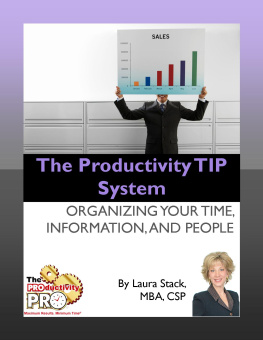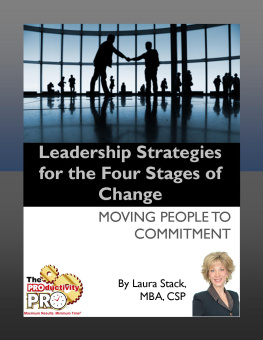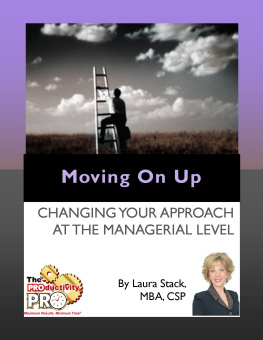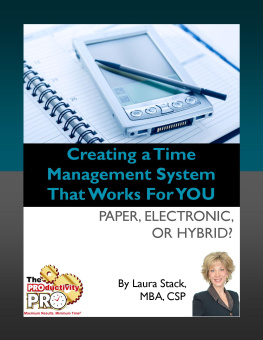Table of Contents
BECOMING SELF-DISCIPLINED:
Make Yourself Do What You Should Do,
Even When You Dont Feel Like It
By Laura Stack, MBA, CSP
Introduction
In this ebook, well discuss how to do what you shoulddo, even when you dont feel like it: self-discipline. Self-disciplineis your ability to maintain consistent, productive behavior. Are youpersistent in completing your high priority tasks each day, without gettingsidelined by menial activities? Do you put your nose to the grindstoneconsistently, or do you only work hard when youre in the mood? Do you have aset of rules that govern your behavior and activity?
Many people have some form of doing well one day and thengetting in a funk and not being able to get back on top of things. Oh sure,everyone has an off day. If you are self-disciplined, however, you exhibitconsistent focus in your day-to-day work, even if you dont feel like it.
You must strive for the self-control and confidence gainedwhen you enforce your own rules. When you see results and you see progress,you will stay motivated. If you need work in this area, this ebook is going tohelp you correct and regulate yourself for the sake of improvement and personalproductivity. You will learn to do what needs to be done, motivate yourself,and exercise restraint over your own impulses, emotions, and desires.
Sometimesworking on the right thing doesnt mean doing the fun thing. To be anexceptional performer in your organization, you must focus on high-valueoutput, not what you feel like doing.
1. Use Your Prime Times
First, we have to look at our natural energy cycles and workeffectively during peak time. Most people have a natural time during the daywhen they feel upI call this prime timeand a natural time when they have lowenergydown time. How do you take advantage of your prime time? Knowing whenthis time is for you is an important productivity enhancer and factor indiscipline.
During prime time, your brain is switched full on. Yourbatteries are charged and you are able to focus. During down time, your brainfeels slow and sluggish, and its difficult to muddle through your work.
I view my energy level like the dimmer switch my husband,John, recently installed in one of our bathrooms. People dont operate at fullon and off. They dont run full-tilt all day and then crash and sleep atnight. Its not zero percent and a hundred percent, but rather various levelsthroughout the day. Most people perform at optimum levels only four to fivehours a day.
You need to know when you have these periods of highenergy. These are your expensive hours, because your brain is capable of doinghigher-level activities during that period of time, compared to other periodsof time during the day when you cant focus or concentrate. Thats why itsimportant to know when youre in prime time, because you can get morehigh-value work accomplished.
Discipline yourself during these times to focus on tasks ofhigh value or importance, critical decisions, problem-solving or brainstormingactivities, or complex and detailed thought. When you force yourself to workon these activities during your prime time, the work takes less time. Duringdown time, creative work takes much, much longer and is more tedious and lesseffective.
Our human nature, however, is to be in a great mood duringour prime times, so the last thing we often feel like doing is workingon those difficult tasks, so its often counterintuitive. You know you need towork on that report or write that proposal or analyze figures, but yourehaving such a good time. Youre having so much fun because you have highenergy, but if you wait until your energy is going down, youve lost the opportunityto get that task done most quickly.
The trick is self-discipline! Resist the urge to do fun,easy, trivial thingssuch as chatting with friends or doing emailduring highenergy periods.
I have two prime times: morning from about 10:30am to noon,and then afternoon, once I catch my second wind, around 2:30pm. When Im inprime time, I must make my client phone calls, because I need to be cheerfuland on top of the conversation. This is also when I do any number crunching orrespond to requests for proposals sent by prospective clients, because I wantto write quickly, succinctly, and creatively. My prime time is the keyopportunity for that work.
Similarly, listen to your body when youre in down time. When I feel my energy waning, a quick glance at the clock usually tells mewhy. I know I need to get up, stretch, and perhaps go for a quick walk aroundthe block, eat an energy snack, or maybe have a cup of tea. Then I go back andwork on different activitiesnot necessarily ones with low prioritiesbut thosethat just dont require the brain power of the prime time tasks.
Sometimes I purposefully let my voicemail pick up my callswhen I know Im in down time, because I know Im not going to be as articulateas Id like to be when Im with a client. If I dont listen to my bodyssignals and respond appropriately, I can get a riproaring headache, preventingme from taking advantage of my second prime time.
So, once you know when your prime time is, protect it forall youre worth. Then listen to yourself and rest when youre down.
2. Control Perfectionism
The second discipline tactic is to control perfectionism,realizing that some things are good enough. Have you ever delegated a task tosomeone and then taken it back because the person didnt do it the right way? Of course the right way is your way because yourway is the perfect way. If this sounds familiar, you may sufferfrom the disease of perfectionism.
Have you ever heard yourselfsaying these phrases?
If I let someone else do this, it wont be done correctly.
If you want anything done right, you have to do it yourself.
If you cant do something right, its not worth doing at all.
If you ever hear yourself saying things like that, becareful. First, its true that if you truly believe that your way is the onlyright way, youre going to harbor resentment towards others.
Second, if you demand that people perform yourway, according to your perfect standards, many people will becontent to let you do it your way, leaving you wondering why you have so muchon your plate.
Third, perfectionism will make you crazy and others aroundyou absolutely nuts from you insisting on having everything just so.
I know this firsthand, because Im what I call a recoveringperfectionist. Ive had to learn the hard way that not every task deserves mybest effort. One seminar attendee said it beautifully: I need help learningwhen to say enough. Every A does not have to have a plus; every wow doesnot have to have an exclamation point after it. Yes, you can strive forexcellence. But always being a perfectionist and refusing to settle foranything less can be detrimental to your time management. As my mother used tosay, sometimes you dont need to put lipstick on a pig.
I think my kids have helped me recover, honestly. WhenMegan, my firstborn, was too young to clean up after herself, I would clean upher playroom at the end of the night. The books would go back into thebookcase, on the correct shelf, in order, by size, height, and topic. Crazy! Now that I have three kids and theyre older, I figure hey, as long as youstuff the toys back on a shelf somewhere, Im happy. It is just fine.
Distinguishbetween high standards and unrealistic expectations. Some things require highstandards and have to be done just so. Most expectations we impose on others,however, are simply picky, picky standards without merit. Become flexible,whether its in assignments or in housework or in relationships. When youreable to let go of small things instead of being bothered by them, there arentas many situations that will provoke you to speak up. Youll feel no need tomention the occasionally blooper; you know to just let some things pass.













